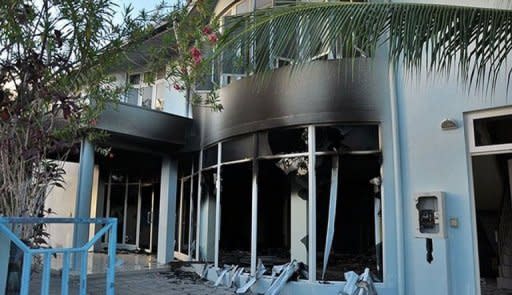Arrest warrant for Maldives ex-president
A judge issued an arrest warrant Thursday for the ex-president of the Maldives, who says he was forced from office in a coup, as troops deployed to restore order in the violence-wracked holiday paradise. Police said they were holding the warrant for Mohamed Nasheed, the Indian Ocean country's first democratically elected president, but had yet to execute the order. "We can arrest him when we feel the need for it. We have to be careful and tactical as to how and when we do it," police spokesman Abdul Mannan Yusuf told AFP. Nasheed, who has hunkered down at his modest family home in the capital Male since losing the presidency on Tuesday, appealed for urgent foreign help. "They have issued a warrant to arrest me now and said that I will be the first former president to spend the rest of his life in jail," he told AFP. "I hope the international community will take note and do something right now." In Washington the State Department said the top US diplomat for south Asia had told Nasheed it was pressing the authorities to protect his security. But spokeswoman Victoria Nuland said the US recognised the new Maldives government as legitimate, referring to Nasheed as "former president" and calling his successor Mohamed Waheed "president". While dozens of Nasheed's supporters surrounded his three-storey home, elsewhere in the country the police and army struggled to re-take control after a night described by a presidential aide as "anarchy". Maldives police commissioner Abdulla Riyas said 18 police stations had been attacked on outlying islands in the archipelago, while numerous court and government buildings had been looted and torched. The images of rioting are potentially devastating for a country which depends on tourism thanks to its crystal-clear turquoise waters, coral-fringed beaches and ultra-luxury resorts. Although resort managers and tour agents have reported only a small number of cancellations, the unrest that followed Nasheed's ousting has begun inching closer to key tourist infrastructure. "The violence has tarnished our image, we have become just another Middle East country with violence on the streets," Mohamed Sim Ibrahim, the secretary general of the Maldives Association of Tourism Industry, told AFP. The clashes escalated on Wednesday when thousands of Nasheed supporters massed in Male. "What happened is utterly disgraceful and it is the saddest day in the modern history of Maldives," newly appointed Home Minister Mohammed Jamil Ahmed told AFP. After small skirmishes in which stones were thrown at police, officers then attacked demonstrators in the capital with batons and beat a number of senior figures of Nasheed's party, several of whom were hospitalised. Nasheed, who has sent his wife and one of his two daughters to neighbouring Sri Lanka for their own safety, was roughed up and briefly detained. As unrest spread to the far corners of the nation of more than 1,000 islands, new president Waheed struggled to maintain order. He made two emergency cabinet appointments -- home and defence -- and troops were dispatched to Addu City in the south and other populated areas to help the police regain control. In Male, where rain fell steadily throughout Thursday, the streets were tense but calm. It is the Maldives' worst unrest since clashes in 2003 following the death of a prisoner at the hands of security forces, an event which sparked the process of democratic change on the Indian Ocean islands. Although no foreign government has referred to a "coup" in the Maldives or publicly criticised Waheed's new administration, diplomatic efforts behind the scenes were seeking to prevent Nasheed's detention, sources said. The British High Commissioner to Maldives, John Rankin, told AFP it would be a "serious concern for us and the international community" if Nasheed were arrested. Arriving in the country, UN envoy Oscar Fernandez-Taranco said it would be critical to ensure Nasheed's safety. The ex-president's rival Waheed was sworn in Tuesday just hours after Nasheed announced his resignation in a televised press conference following a mutiny by police. Nasheed later claimed that armed rebels had threatened him with weapons if he did not step down, a plot he alleged was backed by opposition leaders with the knowledge of Waheed, his former vice president. Waheed and the army have denied the coup charges, although a military spokesman admitted officers had "advised" the ex-president to step down. Nasheed came to power in 2008 after rising from grassroots opposition to the 30-year autocratic regime of former president Maumoon Abdul Gayoom, who imprisoned him on several occasions. His dramatic resignation followed weeks of anti-government protests that escalated after Nasheed ordered the army to arrest Criminal Court Chief Justice Abdulla Mohamed on charges of misconduct and favouring opposition figures.





